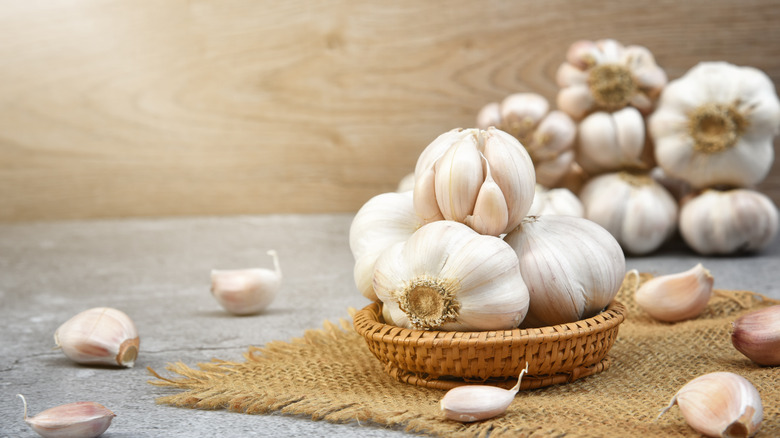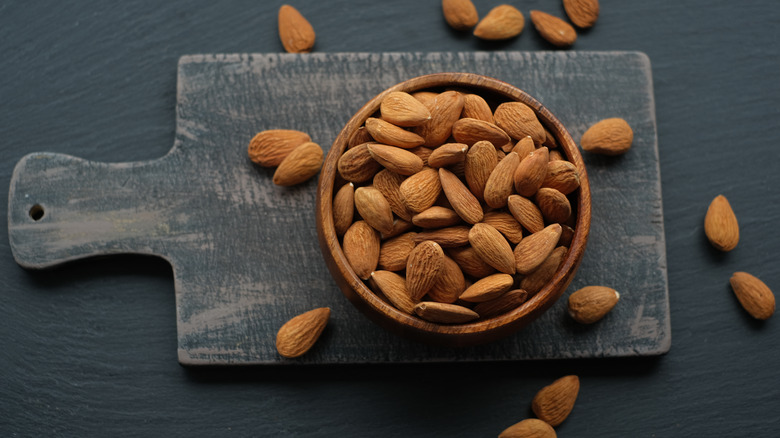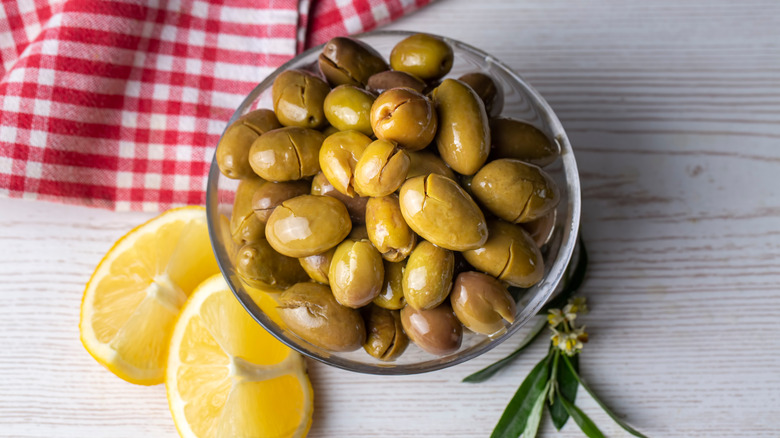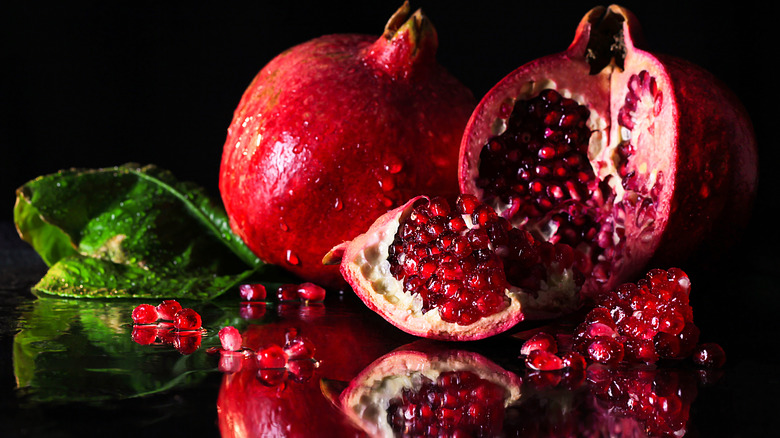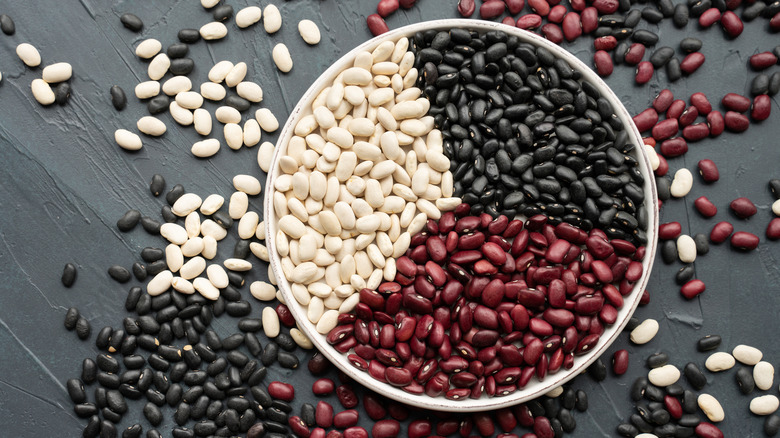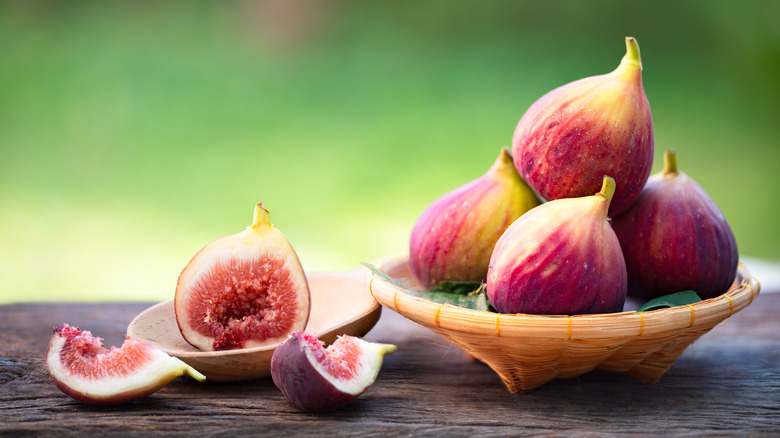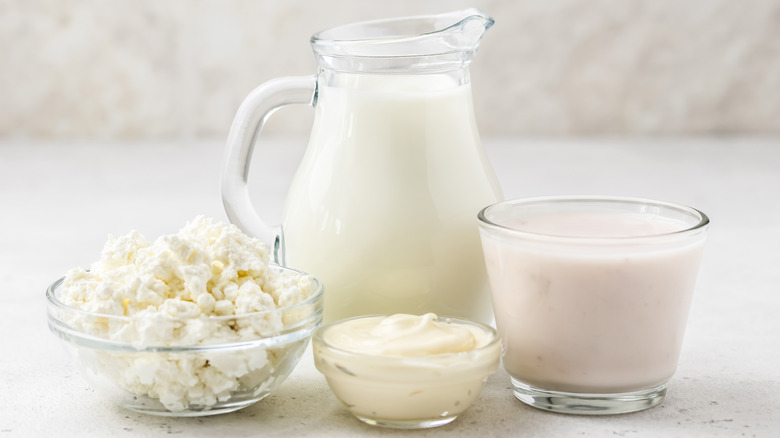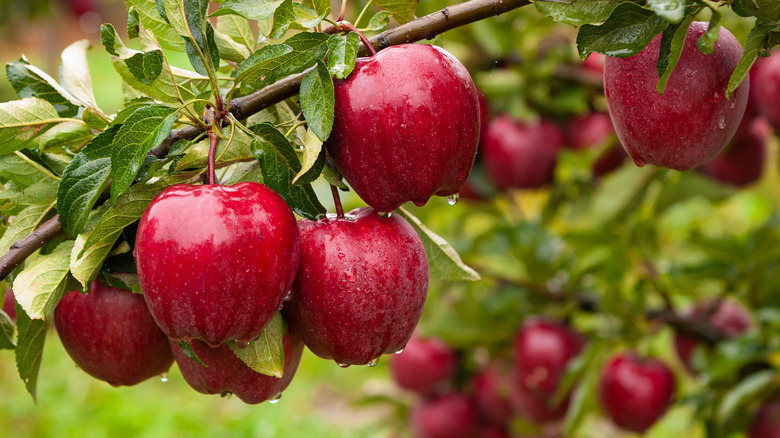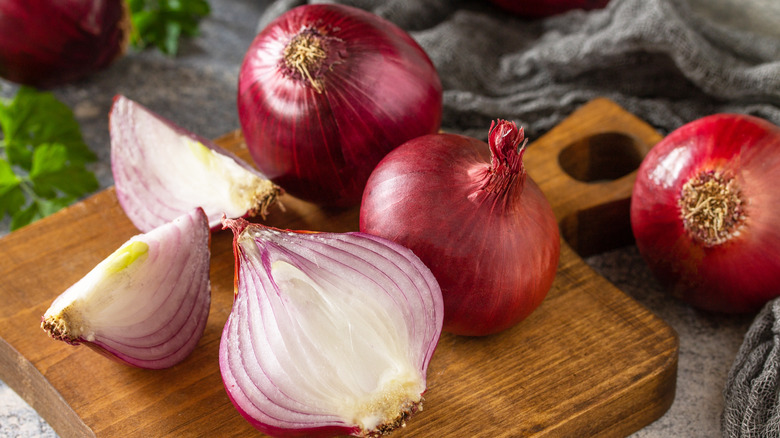Superfoods You Didn't Realize Were In The Bible
It seems like every few months a new "superfood" hits the headlines as the latest, greatest, must-eat item to ward off disease and extend your life. Items like spinach, cauliflower, broccoli, and salmon have certainly all earned the title. But in reality, there's no specific definition to designate foods as "superfoods." Really, any food that's nutrient-rich and contains vitamins and minerals that have been linked to health benefits can claim the title of "superfood." In fact, according to an article published by Harvard's T.H. Chan School of Public Health, the term "superfood" originated not as a title given to specific foods by dietitians or those who study nutrition, but rather by marketers trying to sell bananas.
The thing is, unprocessed (or minimally processed) foods — fruits, vegetables, herbs and spices, whole grains, lean proteins, and fatty fish — all feature a wide range of health-related benefits. And considering the fact that there wasn't much processing available during biblical times, almost any food mentioned in the Bible meets the requirements to be a superfood. So if you're looking to give your diet a Bible-style makeover to increase your intake of high-quality foods, consider adding the following items to your weekly menu.
Garlic
"We remember the fish we ate in Egypt at no cost — also the cucumbers, melons, leeks, onions and garlic." Numbers 11:5
Garlic may not be one of the first foods you think of when you think about biblical feasts, but it's actually been used as a medicinal herb for centuries. And really, when you think about sitting down for the Lord's Supper of bread and wine, it sounds a whole lot tastier if you consider that garlic bread counts as a Bible-friendly carb, no?
The thing is, garlic boasts a slew of potential health-related benefits, so adding a little (or a lot) to your diet, is a great way to boost your intake of good-for-you nutrients. In a 2020 review study on the potential health benefits of garlic published in the journal Antioxidants, lead researcher Johura Ansury and colleagues found 83 different human intervention trials that looked at garlic's benefits. What the researchers found was that garlic's properties help boost heart health, work to prevent high blood sugar and high blood pressure, and prevent cancer, all due to the antioxidant, anti-inflammatory, and lipid-lowering activities. Of course, upping your intake of garlic isn't a surefire way to prevent every potential disease, but it's a tasty way to try.
Almonds
"Then their father Israel said to them, 'If it must be, then do this: Put some of the best products of the land in your bags and take them down to the man as a gift — a little balm and a little honey, some spices and myrrh, some pistachio nuts and almonds.'" Genesis 43:11
Pretty much any nut can be considered a superfood, given the healthy fats and vitamins they provide. But it may come as a surprise that almonds (and pistachios!) are mentioned in the Bible. The Middle East is actually ripe with nut trees of all types, including walnuts, pistachios, and almonds, so whichever you decide to add to your repertoire is pretty much guaranteed to be Bible-friendly and good for you, too. According to an article on Healthline, a single, 1-ounce serving of almonds is packed with 3.5 grams of fiber, 6 grams of protein, vitamin E, manganese, magnesium, copper, riboflavin, and phosphorus. Plus, the fiber and protein, working together with the 14 grams of fat, making almonds an excellent snack to help keep you full (and full of nutrients) until your next meal.
Olives
"...a land with large, flourishing cities you did not build, houses filled with all kinds of good things you did not provide, wells you did not dig, and vineyards and olive groves you did not plant — then when you eat and are satisfied..." Deuteronomy 6:10-11
You may not have spent a lot of time thinking about it, but olives are a fruit, not a vegetable, and according to Healthline, they're actually related to fruits like mangoes and cherries (and even almonds and pistachios, apparently). While they have a decidedly more bitter, salty, and slightly tangy flavor compared to their "relatives," olives come packed with good-for-you nutrients that qualify them as a "superfood." Namely, they're high in fiber and healthy fats (and the fat-soluble vitamin E), and they also feature significant amounts of antioxidants which are known to help prevent cell damage and disease. Namely, oleanolic acid is one antioxidant found in olives that works as an anti-inflammatory that can help manage blood fats and reduce liver damage. As such, olives (and olive oil) are viewed as heart-healthy foods that should be included in a well-balanced diet.
Pomegranates
"For the Lord your God is bringing you into a good land — a land with brooks, streams, and deep springs gushing out into the valleys and hills; a land with wheat and barley, vines and fig trees, pomegranates, olive oil and honey..." Deuteronomy 8:8
Fruits like pomegranates don't get quite the same press in the Bible as, say, grapes and their subsequent "juice" (also known as wine), but as Deuteronomy points out, a land full of pomegranates, olive oil and honey is surely a good place to live. According to an article on Healthline, pomegranates might just be one of the healthiest fruits in the world due to the unique nutrient profile. A one-cup serving of the juicy seeds includes an impressive 7 grams fiber, 3 grams protein, roughly a third of the daily recommended intake for vitamins C and K, along with folate and potassium. But what really sets them apart is their plant compounds — punicalagins and punicic acid. These antioxidants are extremely powerful and can help reduce inflammation and prevent chronic diseases like heart disease, cancer, and diabetes.
Beans
"...They also brought wheat and barley, flour and roasted grain, beans and lentils, honey and curds, sheep, and cheese from cows' milk for David and his people to eat. For they said, 'The people have become exhausted and hungry and thirsty in the wilderness.'" 2 Samual 17:27-29
When people have "become exhausted and hungry and thirsty in the wilderness," what better way to help them replenish their energy reserves than by serving them a feast of superfoods, including beans? And while you might have heard the rhyme, "beans, beans, a wonderful fruit, the more you eat, the more you toot," you may not have associated beans with many other health benefits (other than being filled with toot-promoting fiber, of course). But beans have been a staple in diets worldwide for thousands of years, in large part because they're readily available, inexpensive, and when paired with foods like rice, offer a complete protein source that can bolster nutrition without the expense and sometimes negative health implications of animal consumption.
According to an article published by North Dakota State University on the health benefits of beans, in addition to being high in fiber and protein, legumes come with an impressive folate content, which is important for producing red blood cells. Plus, they're generally low in calories, which can help with weight management. And because, like most plant foods, they're a rich source of antioxidants, regular consumption can help play a role in the prevention of diseases like heart disease and cancer.
Fish
"Then he took the seven loaves and the fish, and when he had given thanks, he broke them and gave them to the disciples, and they in turn to the people." Matthew 15:36
In the Gospel of Matthew, the fish and loaves shared by Jesus and his disciples ended up being one of the prophet's miracles, where he somehow multiplied the meager seven loaves and fish to feed 4,000 people. Well, you may not have the same miraculous results that next time you add fish to your menu, but you may enjoy a different type of "miracle" in the form of superfood benefits.
It's impossible to know exactly what type of fish was served to the thousands, but a retired Navy chaplain on Quora surmised it might have been tilapia given how much is currently fished from the Sea of Galilee (where this miracle took place). Regardless, almost all fish carry health benefits, although the specifics vary slightly from one variety to another. According to the Washington State Department of Health, fish features omega-3 fatty acids and fat-soluble vitamins like vitamin D, along with numerous minerals including iron, zinc, iodine, and magnesium. Omega-3 fatty acids are particularly important as many people don't consume enough of these nutrients that provide anti-inflammatory and antioxidant properties to help bolster heart and brain health.
Eggs
"Can that which is unsavory be eaten without salt? Or is there any taste in the white of an egg?" Job 6:6
So, to be fair, some people in health-food circles do, in fact, just want the plain taste of an egg white in order to cut down on consuming the fat and cholesterol content found in egg yolks. That said, the reference to eggs in the Old Testament's book of Job makes it obvious that eggs were a normal part of meals during biblical times. And where you land on the "eat the egg yolk or don't" spectrum is really neither here nor there (although the egg yolks are particularly nutrient-rich). Eggs are an excellent source of protein (6 grams per large egg), choline, vitamin A, folate, vitamin B5, B12, and B2, phosphorus, and selenium. And according to an article on Healthline, if you pick up a carton of omega-3 enriched eggs, you'll get an extra dose of anti-inflammatory and antioxidant properties offered by the fatty acid along with additional vitamin A and vitamin E.
And, contrary to popular belief, even though egg yolks are high in cholesterol, they don't adversely affect cholesterol levels in the vast majority of people who consume them. As Healthline points out, even those who do experience a slight increase in cholesterol readings after consuming eggs regularly, the increase is likely to be seen in HDL, the good cholesterol, rather than LDL, the bad cholesterol. As a result, they may actually help reduce the risk of heart disease.
Figs
"In those days I saw men of Judah treading out their winepresses on the Sabbath. They were also bringing in grain, loading it on donkeys, and bringing their wine, grapes, figs, and all sorts of produce to Jerusalem to sell on the Sabbath..." Nehemiah 13:15
Grapes and wine may get a lot of attention in the Bible, but they're not the only fruit widely mentioned. According to Bible Places, figs are mentioned quite a bit in Bible passages. And while they tend to be less popular than other fruits in the United States, they're chock full of good-for you nutrients. For starters, the fiber content of figs is good for digestive health and could help those who suffer from irritable bowel syndrome (IBS). In a 2019 study of 150 patients with IBS whose primary symptom was constipation, those who consumed roughly four dried figs twice per day experienced a reduction in symptoms that the control group didn't experience. Namely, they experienced less pain and bloating, they had more frequent bowel movements, and softer stools. And with the reduction in symptoms, they experienced a simultaneous improvement in quality of life.
According to Healthline, fig consumption is linked to improved blood sugar levels and better vascular health (which in turn may reduce the risk of heart disease). So go ahead and grab a bag of dried figs to nosh on as a snack. Paired with nuts, it's the type of superfood combo that can fill you up while improving your overall health.
Goat Milk
"You will have plenty of goats' milk to feed your family and to nourish your female servants." Proverbs 27:27
Goat milk may not be on your regular shopping list, but it might be time to give it a try. Like cow's milk, goat milk offers a balanced mix of carbohydrates, fats, and proteins, and provides a good source of calcium, phosphorus, and potassium. What may come as a surprise is that individuals who experience stomach discomfort due to the lactose found in cow's milk and other cow-derived dairy products may be able to digest goat's milk and other goat-derived dairies without the same negative symptoms. According to Organic Facts, this is due to the higher level of beneficial fatty acids found in goat's milk.
But the benefits don't stop there. According to The Journal of Nutrition, goat's milk has higher levels of selenium than cow's milk, and selenium is a mineral that plays an important role in immune health. Plus, the high levels of calcium (and the fact that humans can absorb the nutrients in goat's milk more easily than cow's milk) make it a good option for building and maintaining strong bones. Just keep in mind, goat's milk doesn't taste the same as cow's milk (just like goat cheese doesn't taste the same as cow cheese) — so give it a try and appreciate the flavor for what it is, rather than being upset that it tastes different.
Apples
"Strengthen me with raisin cakes, refresh me with apples, for I am weak with love." Song of Solomon 2:5
The forbidden fruit that Adam and Eve disobediently ate in the Garden of Eden, thus getting all of humankind thrown from grace, is often portrayed as an apple. But in reality, the Bible doesn't specify what type of fruit this really was. Rather, when apples are mentioned in the Bible, it's typically in a positive way, acknowledging the fruit's refreshment value (as in Song of Solomon). And just as the saying goes, "An apple a day keeps the doctor away," apples have earned their right to be considered a superfood and help ward off disease.
As Healthline points out, a single apple features 4 grams of fiber, vitamin C, potassium, vitamin K, and up to 4% daily value of manganese, copper, and vitamins A, E, B1, B2, and B6. Certainly, you can't count on just eating an apple to ward off all possible ailments, but an apple a day it's an easy way to help boost your daily nutrient intake. Plus, the compounds found in apples have been linked to a lower risk of developing type 2 diabetes, lower rates of death from cancer, even a lower risk of asthma.
Onions
"We remember the fish we ate in Egypt at no cost — also the cucumbers, melons, leeks, onions and garlic." Numbers 11:5
Onions, again, aren't a food that's commonly associated with the Bible, but this flavorful vegetable has more than its fair share of health benefits that certainly qualifies it as a superfood. As an article on Healthline points out, onions are full of vitamin C and vitamin B, along with numerous antioxidants which are linked to preventing chronic ailments like cancer, diabetes, and cardiovascular disease. But one benefit that may come as a particular surprise is that onion consumption is linked to improved bone health. A study published in the journal Menopause in 2009 found that the women in the study who ate onions at least once a day had higher levels of bone density than those who ate them less frequently. What was particularly interesting was that older women who ate onions frequently were much less likely to fracture a hip than those who never ate them. While researchers were only able to guess why this benefit presented itself, they believe it's linked to the high levels of antioxidants that help prevent bone loss over time.
If that isn't reason enough to stir fry up some onion, the Healthline article also points out that onions (and their relatives garlic, shallots, and leeks) are considered prebiotics. These compounds are good for gut health and can help boost levels of probiotics, which in turn can improve digestion and boost immunity.

